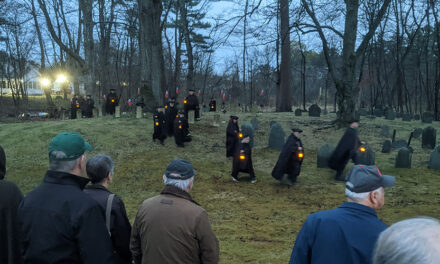Published in the February 8, 2017 edition
By DAN TOMASELLO
LYNNFIELD — Townspeople’s responses to the Master Plan Survey were overwhelming.
The Master Plan Steering Committee received 906 responses to the survey last month. The Master Plan Steering Committee and Planning Board instituted the survey as part of an effort to update the town’s Master Plan.
In an interview with the Villager, Master Plan Steering Committee Chairwoman Heather Sievers said she was pleased with the number of responses the committee received. She attributed the 906 responses to the fact local officials urged residents to take the survey.
“We got a great response rate,” said Sievers. “We were not expecting that number. A lot of people were helping us out and telling people to take the survey. I think that is why we got such a strong response.”
State law requires planning boards to create a master plan in order to “provide a basis for decision making regarding the long-term physical development” of a municipality. According to the law, a master plan must be “consistent in its policies, forecasts and standards.”
Lynnfield has not updated its Master Plan since 2002.
The survey included 59 questions covering the following topics: Planning philosophy; economic development; zoning and land use; housing; public services and facilities; communication; recreation and open space; transportation; environmental issues and energy; governance; and historical and cultural resources.
According to Sievers, the 906 responses to the survey “represented households of all different ages from every corner of town.” She said the Master Plan Steering Committee is in the process of compiling demographic data.
Sievers said, “respondents were solidly in favor of proactive planning versus reacting to crises.”
“Lynnfieldians favored both long range planning and anticipation of potential development opportunities that may or may not arise for the town,” said Sievers.
Additionally, Sievers said the survey’s results revealed the Master Plan Steering Committee needs more information on the town’s planning philosophy because the survey “received a large percentage of ‘don’t know’ responses and related questions in comment sections.”
According to Sievers, residents who responded to the survey’s economic development questions were “generally averse to change,” with the exception being relocating the DPW. Most responders indicated they preferred preserving open space and recreation areas.
Sievers said residents who responded to the survey were “generally opposed” to making zoning and land use changes.
“Seniors appear to be the most opposed, but further work with the data is required before this can be confirmed,” said Sievers.
Sievers said most of the responders preferred that “Lynnfield remain a community that is dominated by single-family homes.” She noted many residents said they “don’t want any more mini-mansions.” She also said a large percentage of responders are opposed to “dense residential developments” such as apartments, condos, multi-family homes and townhouses.
“Other housing that was favored was senior housing, and also-in-law suites in existing homes,” said Sievers.
Sievers said “people were generally in favor of new or updated town facilities,” but seniors were less enthusiastic about renovating or building new town facilities.
“Final results were in the following order: Library, open space, recreation center and Senior Center expansion, with police and fire stations lagging,” said Sievers. “However, these questions reflect wants as opposed to needs and have no cost information included.”
According to Sievers, responders “strongly prefer” learning about town news from newspapers. She said people also learn about town news from newsletters and the town website.
“Many people commented that the town’s website needs to be upgraded,” said Sievers.
In regards to the recreation and open space component of the survey, Sievers said, “there is strong support for retaining and even growing the open space in town.”
“In terms of recreational spaces, most people are satisfied to some degree with current offerings and use them with some regularity,” said Sievers. “However, there is confusion to whether the recreational facilities at schools can be used by non-students. Recreational facilities people would like to add, in order, are walking trails, rail trail to North Reading, playgrounds and a dog park.”
Sievers said the transportation component of the survey revealed the town’s sidewalks and roadways need improvements. She also said vehicles speeding needs to be addressed.
“The form of public transit most desired is shuttles to subway or commuter rail stations, particularly the Wakefield Commuter Rail station, Oak Grove and then Logan Express,” said Sievers.
Sievers noted the transportation component of the survey revealed, “respondents were generally in favor of the Wakefield-Lynnfield Rail Trail.” She said the survey revealed about half of the respondents opposed to the rail trail “were willing to consider just a trail between the middle school and new library site.”
According to Sievers, the environmental issues and energy component of the survey revealed most responders favored protecting the environment. She said residents were supportive of renewable energy.
“Solar was preferred to wind energy,” said Sievers.
According to the governance component of the survey, Sievers said responders strongly opposed implementing a representative Town Meeting format. She noted the survey revealed voters “were more open” to changing the Town Charter that would create a five-member Board of Selectmen.
“Townspeople were solidly in favor of prohibiting recreational marijuana businesses in town,” Sievers added.
According to Sievers, “historic preservation was generally favored in town, but less so when it increased taxes.”
Sievers will continue analyzing the survey’s results this month. She noted the Master Plan Steering Committee has applied for a grant from the Metropolitan Area Planning Council (MAPC), which the committee hopes to use when developing strategies for a public meeting.
“Hopefully we will get the grant,” said Sievers.
Sievers said the public hearing will be announced at a later date.




